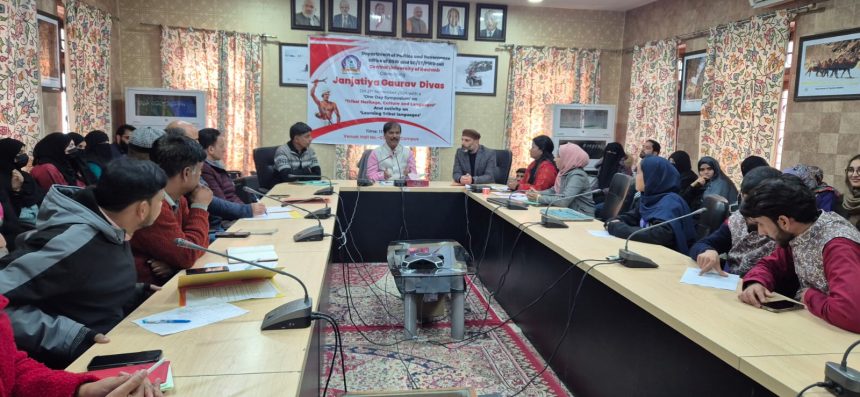Ganderbal, Nov 21: The Department of Politics and Governance, in collaboration with the Directorate of Students Welfare, and SC/ST/PWD cell of the Central University of Kashmir (CUKashmir) celebrated the Janjatiya Gaurav Diwas-2024 by organising a symposium on “Tribal Heritage, Culture and Languages in Jammu and Kashmir” at varsity’s Green Campus here on Wednesday.
Addressing the participants, Vice-Chancellor, Prof. A Ravinder Nath, said, the day recognizes the extraordinary contributions of tribal communities to the country’s cultural and historical fabric. Recalling the contribution of Mr. Birsa Munda in the freedom struggle of the country, Prof. A Ravinder Nath, said, “Birsa’s movement was not merely a political revolt but a cultural and spiritual awakening. He called for the establishment of “Birsa Raj” (Birsa’s kingdom), envisioning a society free from exploitation and oppression. Birsa’s leadership united the Munda tribe, instilling a sense of identity and purpose. His call to arms inspired the tribals to resist the British and landlords, leading to widespread uprisings in 1899-1900,” Prof A Ravinder Nath said. He added that Mr Birsa Munda’s legacy goes beyond his rebellion. “He symbolizes the fight for justice, equality, and the preservation of indigenous cultures,” CUKashmir VC added.
In his speech, Dean School of Social Sciences, Prof. Fayaz Ahmad Nikka, said that Mr. Birsa Munda’s life serves as a reminder of the resilience and strength of tribal communities and their crucial role in India’s freedom struggle against British colonialism. “Mr. Birsa was not only a political leader but also a social reformer. He rejected superstitions and oppressive practice“By preserving their cultural legacy, we not only honour their past but also enrich our collective future,” he further said.
Addressing the gathering, Dean DSW, Dr. Irfan Alam, said the Governmental and non-governmental organizations must work together to provide tribal communities with opportunities for education and economic development while respecting their traditional lifestyles.








